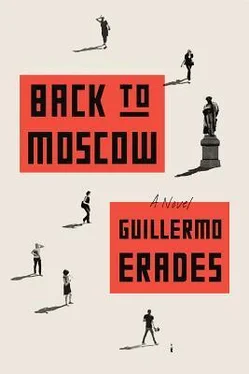‘All the sailors will die,’ she said.
‘Why?’ I asked, irritated by so much Russian negativity.
Lena looked confused by my question. She placed her fork on the plate and took a sip of wine. ‘Because we are in Russia,’ she said. Then she went back to eating her pelmenis.
Catching sight of my own reflection in the silvery surface of the samovar, it dawned on me that Russians regarded tragedies, deaths, not as extraordinary and avoidable events, but rather as an integral part of normal existence. The expected.
As if listening to my thoughts, Lena grabbed my hand and, with a sad smile, added, ‘That’s how things always end up here.’
After dinner, we moved back to the couch to watch a film. It was an old soviet film I had read about and insisted on watching. It turned out to be in black and white — long, slow, arty. Lena fell asleep before the end. Through the open balcony door I could hear the murmur of expats having drinks at Scandinavia.
Lena had a soothing effect on me. When I was concerned about something in particular, or when my thoughts were drifting towards a darker place, it was enough for me to check that Lena was there, next to me. For some reason, the physical proximity of her body gave me a reassuring sense of calm.
In fact, I often found myself wishing that Lena were at home with me. With another girl I would chat for a while, have tea, and that would be nice but, at some point during the evening, I would be struck by an irrepressible urge to be alone. Sometimes, if the dyev was perceptive, she would sense my mood darkening and would leave the flat on her own initiative. But often the dyev would insist on staying around. In those cases, I would grow irritable, my Russian would become sloppy and, as the evening advanced, communication between the two of us would deteriorate. The dyev would then try to bridge the emotional gap, now evident to both of us, with physical contact, but, at this point, physical contact would no longer work for me.
Lena, on the other hand, knew when I needed space. Maybe it was something she’d picked up from her readings on compassion and all that spiritual stuff. She never forced herself upon me.
With Lena, I talked about films and books and food and current news, about everything, really, aside from other girls. Not being able to discuss girls with Lena was a nuisance, since it ruled out the most important part of my research and a large proportion of the time I wasn’t spending in her company. In a way, I wished I could talk to Lena about other girls because for me they were not that relevant, and they certainly did not affect the way I felt about her. But she never asked, at least not in a direct way, and I assumed we had somehow agreed to avoid the issue.
Over the next couple of days I followed the news about the submarine, wishing for a happy ending for the sailors, until, finally, it became clear that they were all dead.
A few days later I learned that Britain and Norway had offered technical assistance and modern equipment to rescue the Russian sailors. From his retreat in Sochi, the Russian president, reluctant to allow foreigners inside the secret nuclear submarine, had respectfully declined the offer.
ONE DAY LENA TOLD me she wanted to show me the beautiful side of Russia. She used those words, beautiful side of Russia, as if all I had seen up to that point were the ugliest bits of the country.
‘Let’s get out of Moscow for a weekend,’ she said. This came as a surprise, as we had never spent more than a few hours together, a night at most, and it was always my idea to meet. But I was intrigued, so we made plans to spend a couple of nights in Suzdal, a small city on the Golden Ring I absolutely had to see, unreachable by train but only four hours away by bus, a place untouched by the buzz of Moscow.
So, on a Friday morning in mid-September, we got on an old bus at Shchyolkovskaya, at the end of the dark blue metro line. After leaving the station, the bus passed through endless rows of identical buildings with grey façades and I tried to imagine the lives of their inhabitants, so far away from central Moscow. Who were they? How did they spend their days? After a while, the road turned greener, and there were dachas and warehouses. Then the forest.
We were sitting near the back of the bus, Lena and I, a row behind two old men who seemed to be sleeping. The bus stopped for a toilet break and, once we were back on, one of the old men, white beard and deep wrinkles, turned round and, pointing at me, asked Lena, ‘Does he drink?’, as if asking permission to feed a dog.
‘You can ask him,’ Lena said, and, before I had time to prepare a clever excuse in Russian, I was pulled out of my seat, finding myself in the very back row, which had been previously unoccupied, sitting with the two men and a bottle of vodka.
When you are the victim of a vodka ambush there is no polite way to get out of it, even if you’re on a bus and it’s only ten in the morning. I had no choice but to join them.
The younger of my two sobutilnikis, my drinking buddies, took a pocketknife out of his bag and began to slice bread and kolbasa. He prepared little buterbrods, which I was instructed to bite after every shot of vodka. He was sickly thin, with pockmarked cheekbones, missing most of his front teeth.We drank out of plastic glasses, toasting first our vstrechu, then friendship, the usual stuff.
They wanted to know if I liked Russia, if I liked vodka, if I liked Russian women. The first bottle was finished and another bottle made an appearance and at some point I realised I must have drunk more than I’d thought because we were singing Russian songs that I was learning as we went.
We arrived at Suzdal around lunchtime and, standing outside the bus, I said do svidaniya, first shaking hands but then with a hug that, to my surprise, became quite emotional, as if instead of strangers on a four-hour journey we were old comrades returning from war. I was given a phone number so that we could call and visit them in Suzdal before we went back to Moscow. I said we would and, before parting, the older man with the white beard told Lena that I was such a khoroshi paren, that he respected me, that I could be Russian.
Suzdal was gorgeous. It was sunny but not too warm and the centre of the town was crammed with beautifully coloured onion-shaped churches, blue and gold and yellow, and at first I thought it could have been the setting for one of Chekhov’s short stories, perhaps an unnamed provincial town, a town called simply S., where life passed without much drama. But as Lena and I walked around the centre, it occurred to me that Suzdal was more spiritual, more mysterious, more Dostoyevskian, and it wouldn’t have surprised me to see one of the Karamazov brothers, Alyosha maybe, turning a corner and walking towards me.
We checked into our hotel, which happened to be a monastery that rented out some izbas to visitors. The izbas, tiny cottages, were located at the back of the monastery, within the walled compound behind the central chapel. Inside, the izba was very clean, with an old wooden bedstead. We left our bags and went for a walk.
Being wasted is a great way to visit a place for the first time, I realised — everything is illuminated in a special light and the impressions are much stronger. Outside the monastery we bought cabbage pirogis and salted cucumbers from a babushka who kept them in a bucket under a piece of cloth. The pirogi was oily but warm and it felt great when I bit into it. We walked into a church, which was dark and moist and smelled of burnt wax and incense. Lena covered her hair with a scarf. She lit tall, thin candles, crossed herself, kissed the icons. Despite her unusual approach to religion, I hadn’t expected Lena to follow these rituals. As she went around the church performing her Christian duties, I stayed behind, admiring the tranquillity of the place, listening to the faint crackling of the candles, breathing the holy air of the temple. I was feeling a growing tickle in my heart, a hint perhaps of my own spiritual awakening, and somehow I ended up wondering what it would be like to start a new life as a monk, spending hours in meditation or prayer, believing in something good, big and supernatural.
Читать дальше












